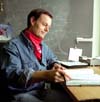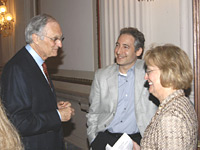 | Friday, May 19, 2006 |
|
Friday, May 19
Monday, May 22 For links to events, click here. |
|
|
Secon Level 3 |
|
Friday, May 19 -New England Clam Chowder -Western BBQ Burger -Tilapia with Tortilla Crust -Swedish Meatballs -Bistro Chicken & Provolone Panini -Assorted Personal Size Pizzas -Carved Top Round of Beef The Wilson Hall Cafe accepts Visa, Master Card, Discover and American Express. |
|
Wednesday, May 24
Thursday, May 25
Chez Leon Menu |
| Fermilab Today is online at: http://www.fnal.gov/today/ Send comments and suggestions to today@fnal.gov Hurricane Relief Page Fermilab Today archive Fermilab Today PDF Version Fermilab Result of the Week archive Fermilab Safety Tip of the Week archive Linear Collider News archive Fermilab Today classifieds Subscribe/Unsubscribe to |
|
Q: I was wondering if you could explain to me about how you let only one atom in the accelerator, if everything is made out of atoms?
A: Let me give you the simple answer first, and then I will explain. We do not let only one atom at a time into the accelerator. Instead we have more than 10 trillion protons and close to a trillion antiprotons in the Tevatron accelerator at once. We get our protons from a bottle of hydrogen gas. Hydrogen is the simplest kind of atom. It has one proton and one electron.
It turns out that we accelerate a lot of them all at once to collide with antiprotons that we make by diverting some of the protons onto a target. When we crash the protons into the target antiprotons come streaming out of it, and we make them into a beam. The antiprotons are created in the target following the rules of Einstein's equation [energy equals mass times the speed of light squared].
If you are a Fermilab physicist who is willing to answer occasional questions from the public, please let us know. You can reach us at today@fnal.gov. |
| Letter to the Sun-Times Editor from Pier Oddone |
On Sunday, Chicago Sun-Times printed a letter from Pier Oddone responding to a May 10 article titled "Not a particle of sense in losing scientific edge." The original article argued that the ILC will be an important asset for the country and the community. "An international linear collider at Fermilab would bring more scientists from around the world to our region," it states. You can read Oddone's letter here. The article, reprinted in the Courier News under a different title, can be found here.
|
|
From FYI: The AIP Bulletin of Science Policy News, May 17, 2006: A Path Forward: "Charting the Course for Elementary Particle Physics" "Elementary particle physics is poised to make potentially transformative discoveries," a National Research Council committee concludes. "If the United States commits to a strategic vision such as the one the committee has laid out, the nation can continue to occupy a position of leadership in this vibrant and exciting field of science. Such an aspiration is worthy of a great nation wishing to remain on the scientific and technological frontiers. It will inspire future generations, repay the necessary investments many times over, and provide a fuller understanding of our place in the cosmos."
An important report has been released by the Committee on Elementary Particle Physics in the 21st Century of the NRC's Board on Physics and Astronomy. Entitled "Revealing the Hidden Nature of Space and Time, Charting the Course for Elementary Particle Physics," this 128-page report outlines a strategy for the United States to sustain its leadership in particle physics. The Committee was chaired by Harold T. Shapiro, President Emeritus of Princeton University.
|
| Brian Greene Gives Congress a Tour of the Quantum Universe |
||
"The ideas of modern physics are so strange that they sometimes seem to not have any relevance to real science," he said. "What's stunning is that that there is a chance that we might be able to test these ideas within the next five to six years."
Beginning with Sir Isaac Newton's laws of gravity and leading up to the modern-day string theory, Greene told the story of Einstein's quest to find a "unified theory" of the universe: a single, all-encompassing framework for explaining the cosmos. "How did the universe begin?" Greene asked. "We can make use of the laws that we know to determine what happened to a fraction of a second after it started. A main goal of the unified theory is to discover what happened in the beginning of the universe."
|
|
Users' Meeting at Fermilab,
Monthly Leave Sheets are due today
Batavia Road closure extended
Power Outage
Volunteer cleanup cancelled
Fermilab Association of Rocketry: Re-scheduled
Save the date New classified ads have been posted on Fermilab Today.
|


